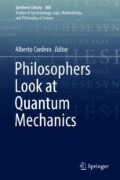Abstract
In contrast to the theories of relativity, quantum mechanics is not yet based on a generally accepted conceptual foundation. It is proposed here that the missing principle may be identified through the observation that all knowledge in physics has to be expressed in propositions and that therefore the most elementary system represents the truth value of one proposition, i.e., it carries just one bit of information. Therefore an elementary system can only give a definite result in one specific measurement. The irreducible randomness in other measurements is then a necessary consequence. For composite systems entanglement results if all possible information is exhausted in specifying joint properties of the constituents.
Access this chapter
Tax calculation will be finalised at checkout
Purchases are for personal use only
Notes
- 1.
Here “quantum theory,” “quantum mechanics,” and “quantum physics” are used interchangeably, all in a very broad sense.
- 2.
A first, somewhat implicit, use of the principle was made in an analysis of two-photon entanglement and of quantum teleportation (see Ref. (Zeilinger 1997).
- 3.
The weakness of the theory lies … in the fact, that it leaves time and direction of the elementary process to ``chance.” (translation by A.Z.).
- 4.
Clearly, the state of an elementary particle is also characterized by other quantum numbers, it is in general an elementary system in more than one property. The cases of Hilbert spaces of higher dimension deserve separate analysis. E.g., a three-state system represents 1 trit of information. Here we restrict our analysis to two-state systems.
- 5.
Just to stress our point again: By ``are the same along z,” we mean something like ``Should they be measured along z, they would be found to be identical,” and analogously for propositions about individual systems. This does not imply that the system necessarily ``has” the measured property before the measurement.
References
Bell, J. (1990). Physics World, 3, 33.
Bennett, H., Brassard, G., Crépeau, C., Josza, R., Peres, A., & Wootters, W. K. (1993). Physical Review Letters, 70, 1895; Bouwmeester, D., Pan, J. W., Mattle, K., Eibl, M., Weinfurter, H., & Zeilinger, A. (1997). Nature 390, 575.
Bohm, D. (1952). Physics Review, 85, 166.
Bohr, N. (1935). Physics Review, 48, 696.
Braunstein, S. L., Mann, A., & Revzen, M. (1992). Physical Review Letters, 68, 3259.
Brukner, C., & Zeilinger, A. (1999). A quantum information invariant. In D. M. Greenberger, W. Reiter, & A. Zeilinger (Eds.), Experimental and epistemological foundations of quantum mechanics (Vienna Circle Yearbook, 1999). Dordrecht: Kluwer Academic.
Brukner, Č., & Zeilinger, A. (1999). Malus’ law and quantum information. Acta Physica Slovaca, 89, 647–652.
Cramer, J. C. (1986). Reviews of Modern Physics, 58, 647.
Einstein, A. (1917). Zeitschrift für Physik, 18, 121.
Einstein, A. (1949). Autobiographical notes. In P. A. Schilpp (Ed.), Albert Einstein: Philosopher-scientist (Vol. 1, p. 65). Evanston: Open Court.
Everett, H., III. (1957). Reviews of Modern Physics, 29, 454.
Ghirardi, G. C., Rimini, A., & Weber, T. (1986). Physical Review D, 34, 470; Pearle, P. (1989). Physical Review A 39, 2277.
Greenberger, M. A. H., & Zeilinger, A. (1989). Going beyond Bell’s theorem. In M. Kafatos (Ed.), Bell’s theorem, quantum theory, and conceptions of the universe (p. 69). Dordrecht: Kluwer Academic.
Mermin, N. D. (1985). Physics Today, 38(4), 38.
Mermin, N. D. (1990). Physics Today, 43(6), 9.
Mermin, N. D. (1998). American Journal of Physics, 66, 753.
Petersen, A. (1985). The philosophy of Niels Bohr. In A. P. French & P. I. Kennedy (Eds.), Niels Bohr, a centenary volume (p. 299). Cambridge, MA: Harvard University Press.
Wheeler, J. A. (1983). Law without law. In J. A. Wheeler & W. H. Zurek (Eds.), Quantum theory and measurement (p. 182). Princeton: Princeton University Press.
Zeilinger, A. (1996). On the interpretation and philosophical foundation of quantum mechanics. In Festschrift for K. V. Laurikainen & U. Ketvel et al. (Eds.), Vastakohtien todellisuus. Helsinki: Helsinki University Press. A copy can be found at our website www.quantum.at
Zeilinger, A. (1997). Philosophical Transactions of the Royal Society of London. Series A, 355, 2401.
Zeilinger, A. (1998). Physica Scripta, T, 76, 203.
Acknowledgments
I wish to thank D. M. Greenberger, M. A. Horne, and A. Shimony for discussions over many years on the foundations of quantum mechanics.
My initial hesitant confidence in the ideas presented here was strengthened by progress in the analysis of some of their implications done in collaboration with Caslav Brukner. This work was supported by Austrian Science Foundation (FWF), Grant S6503, and by U.S. National Science Foundation Grant PHY 97-22614.
Author information
Authors and Affiliations
Corresponding author
Editor information
Editors and Affiliations
Additional information
This paper is dedicated to Daniel M. Greenberger on the occasion of his 65th birthday.
Rights and permissions
Copyright information
© 2019 Springer Nature Switzerland AG
About this chapter
Cite this chapter
Zeilinger, A. (2019). A Foundational Principle for Quantum Mechanics. In: Cordero, A. (eds) Philosophers Look at Quantum Mechanics. Synthese Library, vol 406. Springer, Cham. https://doi.org/10.1007/978-3-030-15659-6_15
Download citation
DOI: https://doi.org/10.1007/978-3-030-15659-6_15
Published:
Publisher Name: Springer, Cham
Print ISBN: 978-3-030-15658-9
Online ISBN: 978-3-030-15659-6
eBook Packages: Religion and PhilosophyPhilosophy and Religion (R0)

